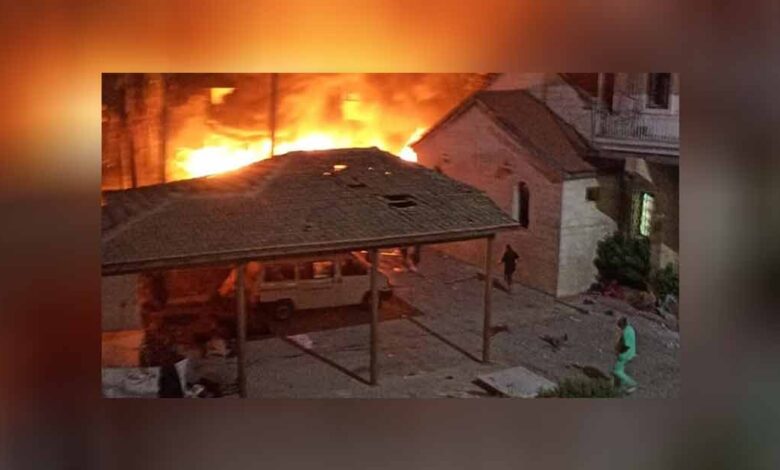
At Least 500 People Killed in Hospital Bombing in Gaza
A devastating tragedy struck Gaza City today as a hospital was bombed, resulting in a staggering loss of life. According to the Palestinian Health Ministry, at least 500 people have been killed in the attack, sending shockwaves across the region.
Palestinian authorities have pointed the finger at Israel for the incident, while Israel, in turn, has accused the Palestinian Islamic Jihad (PIJ) group of being responsible for the explosion. The PIJ, an Islamist militant group, vehemently denies any involvement.
The Israel Defence Forces (IDF) claim that the explosion occurred due to a misfired Palestinian rocket aimed at Israel. Israeli Prime Minister Benjamin Netanyahu strongly condemned the incident, attributing it to “barbaric terrorists” in Gaza and asserting that Israel’s military was not responsible.
In the aftermath of the hospital bombing, Palestinian President Mahmoud Abbas declared three days of mourning and canceled a planned meeting with US President Joe Biden. The casualties from the blast, estimated at around 350 people, were urgently transported to Gaza City’s main hospital, al Shifa, which was already overwhelmed with those injured in previous strikes, stated the hospital’s director, Mohammed Abu Selmia.
Hamas, a Palestinian militant group, issued a statement denouncing the incident as a “crime of genocide” and placed blame squarely on Israel. They described the horrifying massacre at al Ahli hospital as an act of genocide that exposed the “ugly face of this criminal enemy and its fascist and terrorist government.”
The international community responded swiftly to the tragic incident. Turkey, Iran, Jordan, Qatar, and the World Health Organization all condemned what they labeled an attack. Protests erupted in cities like Ramallah and Hebron, with former Hamas chief Khaled Meshaal calling on supporters to demonstrate outside Israeli embassies. Some protesters clashed with Palestinian security forces.
If confirmed, this attack would represent the deadliest Israeli airstrike in the five wars fought since 2008. Archbishop of Canterbury Justin Welby expressed his sorrow, emphasizing that the Ahli hospital is run by the Anglican church, and he urged people to pray for the affected individuals. The hospital had already been hit by Israeli rocket fire on October 14, injuring four staff members.
Treasury minister Andrew Griffith reaffirmed the UK’s call for the protection of civilian lives, describing the hospital attack as “devastating.” The hospital’s cancer center was among the parts severely damaged in the strike, as reported by the American Friends of the Episcopal Diocese of Jerusalem, an organization that assists in raising funds for the hospital.
Earlier in the day, the UN agency for Palestine (UNRWA) reported that at least six people were killed when one of its schools in the al-Maghazi refugee camp was shelled. This school had been serving as a shelter for around 4,000 displaced citizens since the outbreak of the war.
Israel’s military asserted that more civilian casualties in the territory were “inevitable,” citing allegations that Hamas fighters were using Palestinians as human shields. Over a million Palestinians were warned by the IDF to move south through Gaza ahead of an expected ground invasion.
The conflict, which began with a surprise attack on Israel by Hamas, has taken a heavy toll. According to the Palestinian health ministry, the war has left 3,000 Palestinians dead and at least 12,500 wounded, with hundreds more believed to be buried under the rubble. Israeli figures indicate that over 1,400 Israelis have died, including 260 at a music festival. Additionally, 199 individuals, including children, were captured by an armed group and taken into Gaza, according to Israel.
Former Hamas chief Khaled Meshaal called for the release of 6,000 Palestinian men and women reportedly held in Israel’s jails in exchange for the captives in Gaza, although it remains uncertain how many hostages are still alive, according to Hamas’s head of political and international relations, Dr. Basem Naim.








































